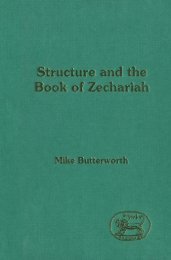Appendix CASE ONE - Collection Point® | The Total Digital Asset ...
Appendix CASE ONE - Collection Point® | The Total Digital Asset ...
Appendix CASE ONE - Collection Point® | The Total Digital Asset ...
You also want an ePaper? Increase the reach of your titles
YUMPU automatically turns print PDFs into web optimized ePapers that Google loves.
Macaulay's 'Utilitarian' Indian Penal Code 147<br />
for accomplishing epic works of social and political reconstruction, whether<br />
at home or abroad. Evangelicals looked to flush out and revitalize native<br />
souls with Christian morality and English education; Utilitarians sought to<br />
satisfy their temporal needs by the provision of efficient government and<br />
sound laws.<br />
It was into this situation, heavy with the expectation of social, economic<br />
and political developments in India, facilitated by the 1833 Act, that Macaulay<br />
was recruited to the central post of legal member of the Governor-General's<br />
Council. 4 Yet he was not an overwhelmingly obvious choice. Why Macaulay<br />
was chosen and why he accepted the appointment is far from self-evident. One<br />
can approach such questions by asking what qualities might be included in any<br />
specification for the post of legal member: most naturally, perhaps, a lawyer<br />
with substantial expertise in framing legislation; someone with experience and<br />
the demonstrated capacity for the routine grind and graft, so much a part of<br />
lawmaking; someone not unlike Sir James Stephen, then a highly influential<br />
and moderately reformist force in the Colonial Office. 5 Indeed, both his<br />
famous sons, Leslie and Fitzjames, testify that not only was he offered<br />
the post but that Macaulay 'strongly advised' him to take it. 6 Although<br />
Macaulay makes no recorded reference to this it seems highly unlikely that<br />
it is without some substance, and that Sir James was not at least sounded out<br />
on the possibility, if not actually made a firm offer. However, whether first or<br />
second choice, after initial resistance from a minority of directors of the East<br />
India Company Macaulay was appointed. 7<br />
Most clearly in his favour was a familiarity with Indian affairs, gained<br />
as Secretary to the Board of Control. He also brought to the position an<br />
unpromising intellectual flashiness, not obviously suited to years of solid<br />
legislative labour in service of the Company under an Indian sun. Macaulay's<br />
unusual intellectual capacities revealed themselves early in life. One famous<br />
4<br />
<strong>The</strong> Council comprised the Governor-General and three member employees of the East India<br />
Company. <strong>The</strong> Council performed a dual function as both the legislative forum and the supreme<br />
executive body of India. <strong>The</strong> law member's function was intended to be exclusively legislative, and<br />
therefore did not entitle him to attend or vote at the Council meetings devoted to executive business.<br />
Macaulay, however, was allowed to take a full role at executive as well as legislative meetings of the<br />
Council.<br />
5<br />
For example, P. Knaplund, James Stephen and the British Colonial System, 1813-47 (1953); D.J.<br />
Murray, <strong>The</strong> West Indies and the Development of Colonial Government, 1801-1834 (Oxford, 1965).<br />
By a combination of ability, appetite for work and unwillingness to delegate, Stephen 'virtually ruled<br />
the Colonial Empire'; Sir Henry Taylor, a friend and colleague at the Colonial Office, Autobiography<br />
(1885), i, 223. Stephen was known to some as 'Mr. Over-Secretary Stephen'.<br />
6<br />
Leslie Stephen, Life of James Fitzjames Stephen (1895), 235, and Fitzjames Stephen, H.C.L., iii,<br />
298, n.2.<br />
7<br />
See, for example, Macaulay to his sister Hannah, 21 October 1833 in G.O. Trevelyan, <strong>The</strong> Life<br />
and Letters of Lord Macaulay (1876, New York, 1877), i, 296. James Mill, then Chief Examiner in the<br />
Company (and effectively the highest official below the two Chairmen of Directors) was 'consulted'<br />
and very 'handsomely' advised the Company to take Macaulay, Macaulay to Hannah Macaulay, ibid.,<br />
1 November 1833, 300.






